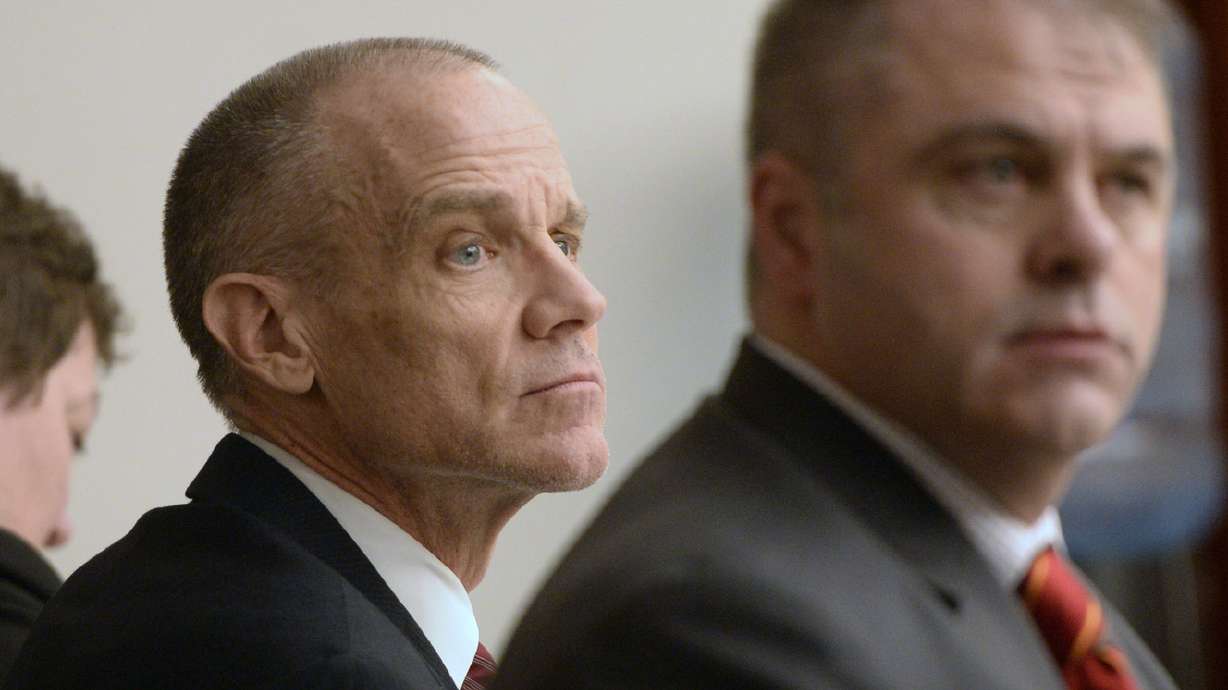Estimated read time: 4-5 minutes
This archived news story is available only for your personal, non-commercial use. Information in the story may be outdated or superseded by additional information. Reading or replaying the story in its archived form does not constitute a republication of the story.
SALT LAKE CITY — A jury will continue deliberations Friday to determine whether Marc Sessions Jenson, a Utah businessman and one-time millionaire, is guilty of fraud and money laundering after a ritzy ski and golf resort he was developing fell apart, costing investors millions.
Jenson is also a key figure in the criminal cases against former Utah Attorneys General Mark Shurtleff and John Swallow.
The jury deliberated for five hours Thursday before deciding to go home for the evening. They will reconvene Friday morning.
Prosecutor Tim Taylor asked the jury to consider the things Jenson didn't tell potential investors as well as what he did say as he convinced investors, some giving up their life savings, to buy into the club.
"If I were to summarize this case, this is a case about deception," Taylor said in closing arguments.
Taylor argued that the Mount Holly Club, a proposed high-end ski and golf resort to be built in Beaver County, was struggling to stay afloat before Jenson began wooing members. It was an act of desperation, Taylor said, fueled by the lavish lifestyle Jenson was accustomed to.
"He hurts people. He changes lives," Taylor said after outlining the losses of each of the four investors named in the case. "Go ahead and tell Marc Jenson, 'You can't do that anymore.'"
The trial marked the first time Jenson has sat on a witness stand, but not his first experience on the wrong side of the law. Victims in the case have claimed Jenson never told them he was a convicted federal felon, faced state securities fraud and racketeering charges, and had filed chapter 7 bankruptcy.
He hurts people. He changes lives. Go ahead and tell Marc Jenson, 'You can't do that anymore.'
–Tim Taylor, prosecutor
Defense attorney Marcus Mumford contends that the "unified front" of victims in the case have aligned their stories to implicate Jenson, and that they were well aware of Jenson's history when they went into business with him.
"Is it believable to you that sophisticated investors … would commit that kind of money without Googling him, without figuring out who this man was?" Mumford asked the jury.
The exclusive Mount Holly Club was to sit on 2,000 acres in the Tushar Mountains and include 1,200 building lots starting at $1 million each, a Jack Nicklaus-designed golf course and a ski area managed by Olympic gold medalist Ted Ligety.
By all early indications, the resort, which looked to emulate the overnight success of the lavish Yellowstone Club in Montana, had all the makings of a highly profitable venture when Jenson started bringing investors in, Mumford said.
"Part of freedom is the freedom to take risks, the freedom to make money and the freedom to lose it," he said in his closing argument.
That all changed when a primary financial backer, New York-based hedge fund XE Capital, stopped following through with its promises in an effort to eventually take over the project, Jenson said.
Disgruntled investors pointed their fingers at Jenson rather than XE Capital after two closed-door meetings with Shurtleff when he was attorney general, Mumford argued.
Related Story
Shurtleff and Swallow are facing their own criminal charges centered around Jenson, who claims they shook him down for money and favors during a trip to the posh Southern California villa where he was living in 2009.
The Utah Attorney General's Office, led by Shurtleff, initially filed charges against Jenson but removed itself from the case in 2013. Mumford sent subpoenas to Shurtleff and Swallow to testify during the trial. Their lawyers filed objections, which 3rd District Court Judge Elizabeth Hruby-Mills upheld.
Jenson's testimony often mentioned Shurtleff, reaching back to a previous conviction when he ultimately took a plea in abeyance on charges of securities fraud. He alleged the plea deal was crafted behind the scenes with Shurtleff through a go-between, his self-described "fixer," Tim Lawson.
Jenson is now serving a 10-year prison sentence after failing to pay restitution in the case. In his testimony, however, Jenson claims he had paid about $2 million in restitution, paying the money directly and bypassing the courts under direction of the attorney general's office.
Prosecutors contend that transfers from Jenson's bank account at the time don't match up with his story.
Marc Jenson's brother, Stephen Roger Jenson, was also charged in the case and accepted a plea deal partway through the trial, pleading no contest to three reduced charges of third-degree felony communications fraud, while one additional fraud charge and 10 counts of money laundering, all second-degree felonies, were dismissed. He will be sentenced March 30.










